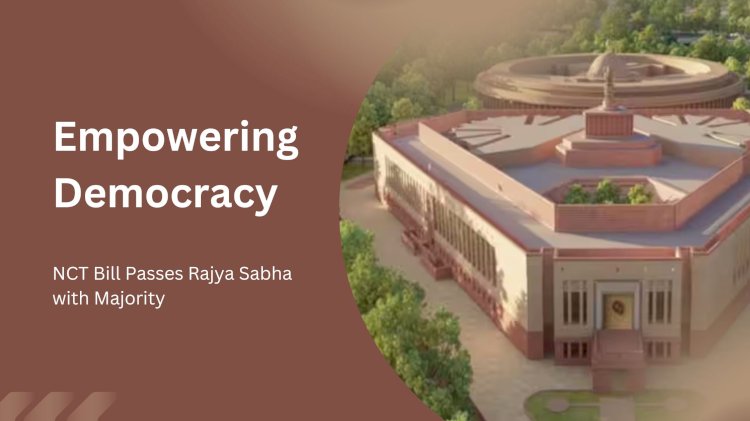Empowering Democracy: NCT Bill Passes Rajya Sabha with Majority
In a groundbreaking development, the NCT Bill has successfully cleared the Rajya Sabha, India's upper house of Parliament. The bill aims to redefine the power dynamics between the elected Delhi government and the Lieutenant Governor, granting more authority to the former in key areas like police, land, and public order. After heated debates, the bill received majority support, emphasizing its potential to strengthen democratic governance and foster efficiency in the National Capital Territory. The successful passage paves the way for transformative changes in Delhi's administrative landscape, promoting transparency, accountability, and better service delivery for its citizens.
By Shreya Rajvanshi Gangal

In a landmark development, the much-debated NCT (National Capital Territory) Bill has cleared the Rajya Sabha, the upper house of India's Parliament. The bill's passage marks a significant step in redefining the power dynamics between the elected Delhi government and the Lieutenant Governor, representing the Central government in the National Capital Region. The bill aims to clarify the roles and responsibilities of both entities and resolve the longstanding administrative and political issues that have plagued Delhi's governance structure.
Key Provisions of the NCT Bill:
The NCT Bill, which was previously passed by the Lok Sabha (lower house), introduces several critical provisions that will shape Delhi's governance framework. One of the major highlights of the bill is empowering the elected government in Delhi with greater authority and decision-making power in various key areas such as police, land, and public order.
Under the new provisions, the Lieutenant Governor's discretionary powers have been curtailed, and the Delhi government's elected representatives are granted more control over local matters. The bill seeks to establish a clearer demarcation between the areas where the Lieutenant Governor can exercise their discretion and those where the elected government can independently make decisions.
Additionally, the bill envisions a mechanism for dispute resolution between the Lieutenant Governor and the Delhi government, promoting better coordination and governance for the benefit of the citizens of the National Capital Territory.
Parliamentary Debate and Passage:
The NCT Bill sparked extensive debates and discussions in both houses of Parliament, with members from different political parties expressing diverse opinions. Proponents of the bill argued that it would strengthen democratic governance in Delhi by giving more power to the elected representatives, who are directly accountable to the people. They emphasised that the bill would bring greater efficiency and transparency to the administration, leading to more effective governance.
On the other hand, some critics raised concerns about the potential for conflicts between the Lieutenant Governor and the elected government. They highlighted the need for a careful balance of powers to avoid any constitutional crises in the future.
Despite the differing views, the bill garnered support from a majority of members in the Rajya Sabha, leading to its successful passage. With the Rajya Sabha's approval, the NCT Bill is now set to become law, pending the President's assent.
Conclusion:
The clearance of the NCT Bill in the Rajya Sabha marks a significant milestone in India's legislative history. By empowering the elected government and redefining the roles of the Lieutenant Governor, the bill seeks to streamline governance in the National Capital Territory, promoting accountability and better service delivery to the citizens. As the bill awaits the President's approval, its implementation is anticipated to bring transformative changes to Delhi's administrative landscape, fostering a more efficient and participatory form of governance.
What's Your Reaction?



















